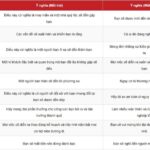Coffee is a beloved beverage for millions of people due to its ability to boost alertness and increase productivity. However, despite its many benefits, not everyone is suited to enjoy this drink. There are certain groups of individuals who may experience side effects or negative health impacts when consuming coffee.
Benefits of Drinking Coffee
Coffee entices not only with its delicious flavor but also its ability to provide numerous health and mental benefits. Firstly, caffeine in coffee boosts metabolism, aids in calorie burning, and effectively controls weight. Additionally, coffee enhances alertness, improves focus, and heightens work efficiency by stimulating the central nervous system.

Drinking coffee in moderation can also protect the liver, reduce the risk of chronic liver disease, and support the detoxification process. Research indicates that coffee drinkers have a lower incidence of liver disease compared to non-coffee drinkers.
Apart from its health benefits, coffee contributes to improved moods, making individuals feel happier due to the stimulation of dopamine production in the brain. Furthermore, conversations over a cup of coffee serve as a connector, fostering sharing and reducing life’s stresses.
Five Groups Who Should Avoid Coffee
1. Individuals with Heart Rhythm Disorders Should Refrain from Coffee
Those diagnosed with heart rhythm disorders must abstain from consuming coffee. Caffeine can stimulate a faster heart rate, elevate blood pressure, and exert pressure on the cardiovascular system. For individuals with a history of heart rhythm problems, coffee may exacerbate the condition, increasing the risk of dangerous complications.
2. Coffee is Not Recommended for Those Prone to Anxiety and Stress
Caffeine can intensify feelings of restlessness and anxiety in individuals with sensitive psychology. If you frequently experience stress, panic, or suffer from anxiety disorders, coffee will aggravate these symptoms. Excessive caffeine intake may lead to palpitations, increased heart rate, and prolonged feelings of unease.
3. Insomniacs Should Limit Coffee Intake
Individuals struggling with sleep disorders, insomnia, or difficulty sleeping should refrain from drinking coffee, especially in the afternoon and evening. Caffeine stimulates the central nervous system, reducing sleep quality and prolonging restlessness, making it harder to fall into a deep sleep. If you’re facing challenges in maintaining healthy sleep patterns, coffee is one of the factors to eliminate.
4. Coffee is Not Advised for Those with Iron Deficiency Anemia

Individuals with iron deficiency anemia should be cautious about consuming coffee. Coffee contains tannins, which inhibit iron absorption from food. Drinking coffee immediately after a meal or regularly can worsen iron deficiency, leading to fatigue, weakness, and overall health implications.
5. Coffee is Not Suitable for People with Gastroesophageal Reflux Disease
Caffeine in coffee can relax the lower esophageal sphincter, allowing acid to reflux into the esophagus, causing heartburn and chest pain. For those suffering from gastroesophageal reflux disease, coffee can exacerbate symptoms, leading to prolonged discomfort.





































